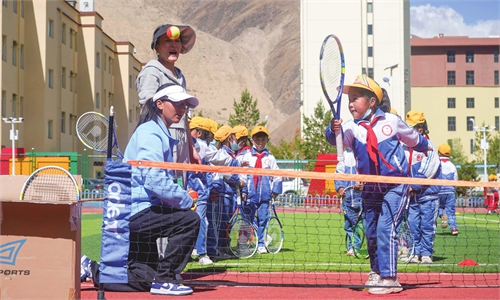Chinese experts from NGO refute disinformation on China’s Xinjiang, Xizang at UN Human Rights Council

Photo:AFP
People from China have the final say on what the country's human rights situation is and a group of experts from a nongovernmental organization in China introduced the practices of China's human rights at a sideline event of the ongoing 52nd session of the Human Rights Council with some experts of ethnic minorities refuting some Western media's disinformation on China's Xizang and Xinjiang regions.
The sideline event was held by the China Society for Human Rights Studies on Thursday in Geneva. It offered an opportunity for Chinese scholars in the human rights field to have more face-to-face exchanges in Geneva with international experts and NGOs after attending the UN Human Rights Council via video link due to COVID-19 reasons.
While China and more countries are working to boost the global human rights cause at the UN Human Rights Council, the US and a handful of countries are abusing the platform, intesifying disinformation and lies to slander China's human rights situation, especially on the Xinjiang, Xizang and Hong Kong regions and trying to push the council to hold a debate over the so-called human rights abuses in the Xinjiang region.
Aside from introducing China's ideas and path of human rights developments, Chinese experts also expressed disappointment and opposition to some countries' intensified politicization and instrumentalization of human rights.
Some separatist groups that seek to split the Xizang region from China also hyped and exaggerated the "observations" made by the UN Committee on Economic, Social and Cultural Rights, in which it expressed "concerns" over reports on an "assimilation policy" in a "coerced boarding school system" in China's Xizang region.
Zhaluo, head of the social economy institute of China Tibetology Research Center who also went to boarding schools in Xizang and studied the region's development for 30 years, talked about the real situation of these schools in the Xizang region at the Thursday sideline event.
The scattered settlement of local residents and inconvenience of traffic in mountainous landscape are the two main reasons why the region needs boarding schools. Zhaluo noted that before 1978, every village in the region had a primary school but the average number of students was 38.5 with less than 10 in each grade. Lack of teachers led to poor education.
The enrollment rates for middle school and high school were 6.5 percent and 5.3 percent respectively and a very small number of students from rural areas could be enrolled in middle school. Only by gathering students to integrate the education resources, the schools can offer high-quality education, said the expert.
For the past decades, the region has explored various patterns of setting schools, including deploying teachers to ride horses to offer tutoring at students' house, setting temporary tents for teaching or night schools, but only the boarding schools fit the region's environment and facilitate local education development. Students in boarding schools can enjoy governmental subsidies.
Zhaoluo refuted claims that students in these schools do not learn Tibetan language. He explained that like other schools in the Xizang region, boarding schools also have bilingual language classes and aside from Putonghua and the Tibetan language, students also learn other foreign languages.
"Whether the boarding schools are good or not, people in the region have the final say," said Zhaluo, noting that these schools have protected the education rights of children of herdsmen who lived in remote areas, helped to cultivate a large number of talents for the region and had a positive influence in students' growth.
After the finding of graves in Canadian residential schools, some Western media began to criticize the boarding schools in the Xizang region to divert the public attention. Boarding schools in other countries should not take the blame for tragedies happened in colonial-style residential schools in Canada, Australia, and the US, said Zhaluo.
As some Western media kept hyping topics on the so-called forced labor in China's Xinjiang region, Niluobaier Aierti, a member from China Society for Human Rights Studies who is also from the Xinjiang region and attended the Thursday event, said there is no such thing as forced labor in the region. The practice of labor transfer in Xinjiang is a successful exploration of the effective allocation of surplus labor resources.
Niluobaier and a group of experts conducted a field survey on five enterprises in South China's Guangdong Province that employ Xinjiang minority workers, interviewing a total of 70 workers covering Uygur, Kazak, Kirgiz and Tajik ethnic groups, and observed the daily work and life of Xinjiang workers in these enterprises.
The study found that the workers of all ethnic groups who worked outside Xinjiang voluntarily chose to work in these companies, and there was no "forced labor" at all.
"There is no destination for human rights protection. We can always do better. The achievements of human rights cause in Xinjiang are obvious to all," said the expert.



